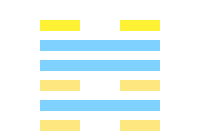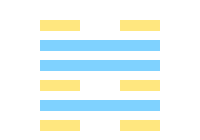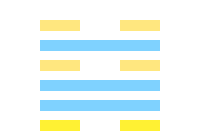47.6 (47 > 6)

47.6 (47 > 6) - THE KHWĂN HEXAGRAM.
The sixth line, divided, shows its subject straitened, as if bound with creepers ; or in a high and dangerous position, and saying (to himself), ‘If I move, I shall repent it.’ If he do repent of former errors, there will be good fortune in his going forward.
Bing DeepL Google Yandex47.6 (47 > 6) - Suffering one last setback
One does not want to continue but one can succeed.
Bing DeepL Google Yandex47.6 (47 > 6) - Suffering one last setback
One does not want to continue but one can succeed.
Bing DeepL Google Yandex47.6 (47 > 6) - K’uán, la détresse
K’uán : détresse, abattement, dureté, sévérité, mauvais traitements.
Un homme en détresse, pris dans des buissons épais, sur une hauteur exposée aux dangers et qui se dit : si je bouge, je le paierai cher. [Quand on éprouve le repentir, on peut corriger le mal et alors on sera heureux. Com. II.].
Bing DeepL Google Yandex47.6 (47 > 6) - Essuyer son dernier revers
On ne veut plus continuer mais on peut réussir.
Bing DeepL Google YandexThe trigrams
The trigrams are combinations of three yin and yang lines. The three bottom lines of the hexagram form the lower trigram and represent the inner situation. The three top lines form the upper trigram and represent the outer situation.
Upper trigram: The lake The sky


Lower trigram: The water

The formation: 47
What is already there

47 - THE KHWĂN HEXAGRAM.
In (the condition denoted by) Khwăn there may (yet be) progress and success. For the firm and correct, the (really) great man, there will be good fortune. He will fall into no error. If he make speeches, his words cannot be made good.
Bing DeepL Google Yandex47 - The embarrassment
Circumstances or appearances play against one. Justifying oneself is useless, one will be understood later.
Bing DeepL Google Yandex47 - The embarrassment
Circumstances or appearances play against one. Justifying oneself is useless, one will be understood later.
Bing DeepL Google Yandex47 - K’uán, la détresse
K’uán : détresse, abattement, dureté, sévérité, mauvais traitements.
K’uan « détresse, abattement (dureté, sévérité) ». Celui qui, dans le danger, ne perd pas son principe de développement et qui en détresse même est encore calme et content, c’est l’homme vraiment grand (kiun tzè). Mais d’abord il peut commettre quelque erreur, tomber en détresse s’il se fie à toute parole ; qu’il ne le fasse pas, car la parole est peu sûre.
Texte
Droit et ferme, le grand homme sera heureux. Qu’il ne se fie pas à tout ce qu’on lui dit. — K’uán est le fort saisi, emprisonné, en détresse.
Symbolisme
Marais sans eau, cela figure la détresse. — Le sage expose même sa vie pour atteindre son but.
Commentaire
K’uán est celui qui est dans la détresse, le danger. Si alors même, il ne perd pas sa grandeur d’âme, c’est vraiment un grand homme. L’homme grand prospère s’il reste fermement vertueux. Mais qu’il ne se fie pas aux dires ; les estimer hautement, c’est s’exposer à sa perte.
47 - La gêne
Les circonstances ou les apparences jouent en notre défaveur. Se justifier est inutile, on sera compris plus tard.
Bing DeepL Google Yandex47 - Kényelmetlenség
A körülmények vagy a kinézet negatív szerepet játszik. Magyarázni felesleges, később meg fogjuk érteni.
Bing DeepL Google Yandex
47.6 (47 > 6) - THE KHWĂN HEXAGRAM.
The sixth line, divided, shows its subject straitened, as if bound with creepers ; or in a high and dangerous position, and saying (to himself), ‘If I move, I shall repent it.’ If he do repent of former errors, there will be good fortune in his going forward.
Bing DeepL Google Yandex47.6 (47 > 6) - Suffering one last setback
One does not want to continue but one can succeed.
Bing DeepL Google Yandex47.6 (47 > 6) - Suffering one last setback
One does not want to continue but one can succeed.
Bing DeepL Google Yandex47.6 (47 > 6) - K’uán, la détresse
K’uán : détresse, abattement, dureté, sévérité, mauvais traitements.
Un homme en détresse, pris dans des buissons épais, sur une hauteur exposée aux dangers et qui se dit : si je bouge, je le paierai cher. [Quand on éprouve le repentir, on peut corriger le mal et alors on sera heureux. Com. II.].
Bing DeepL Google Yandex47.6 (47 > 6) - Essuyer son dernier revers
On ne veut plus continuer mais on peut réussir.
Bing DeepL Google YandexIn the making: 6
What is poised to happen

6 - THE SUNG HEXAGRAM.
Sung intimates how, though there is sincerity in one's contention, he will yet meet with opposition and obstruction ; but if he cherish an apprehensive caution, there will be good fortune, while, if he must prosecute the contention to the (bitter) end, there will be evil. It will be advantageous to see the great man ; it will not be advantageous to cross the great stream.
Bing DeepL Google Yandex6 - Insubordination
One cannot continue like this because others are not inclined to remain passive. Do not use force to conclude. Entrust a mediator.
Bing DeepL Google Yandex6 - Insubordination
One cannot continue like this because others are not inclined to remain passive. Do not use force to conclude. Entrust a mediator.
Bing DeepL Google Yandex6 - Song, la contestation
Song : Recours au prince, procès, affaires publiques.
Texte
L’homme droit les empêchera ; même en y procédant avec crainte et prudence, si le milieu en est heureux, la fin en sera funeste. On pourra aborder les grands, mais on ne traversera pas les difficultés.
Symbolisme
I. Force au-dessus, péril au-dessous (pour le petit qui plaide) représentent les procès.
II. Le ciel (au-dessus), l’eau (au-dessous) forment le koua (d’où danger). Le sage, entreprenant une affaire délibère mûrement sur son commencement (avant de commencer).
Commentaire
Un procès ne doit pas être poussé jusqu’à sa fin ; on ne triomphera pas des difficultés et l’on tombera dans un abîme. Le sage met au-dessus de tout le juste milieu et la droiture (et non le triomphe).
6 - L'insubordination
On ne peut pas continuer comme ça car les autres ne sont pas enclins à se laisser faire. Ne pas utiliser la force pour conclure. Faire confiance à un médiateur.
Bing DeepL Google Yandex6 - Követelés
Akadályozzák a haladását, noha az igazság oldalán áll. Nem szabad erővel győzni. Rá kell bízni egy közvetítőre.
Bing DeepL Google YandexThe nuclear hexagram: 37
The nuclear hexagram is the association of the two inner trigrams (lines 2,3,4 and 3,4,5). It represents the root, or the origin of the situation.

37 - THE KIÂ ZĂN HEXAGRAM.
For (the realisation of what is taught in) Kiâ Zăn, (or for the regulation of the family), what is most advantageous is that the wife be firm and correct.
Bing DeepL Google Yandex37 - Kia, la parenté, le clan
Kiā : famille, maison.
Texte
L’homme lui donne la prospérité, la femme la complète et la consolide.
Symbolisme
Vent sortant du feu. Le sage parle selon la réalité et tient une conduite toujours bien réglée.
Commentaire
La femme remplit les fonctions à l’intérieur ; l’homme à l’extérieur. L’observance des règles dans leurs actes et leurs rapports, c’est le suprême droit du ciel et de la terre. Le chef de maison a la dignité, l’autorité suprême ; il est appelé père-mère. Quand le père et le fils, les frères aînés et les cadets, les époux, sont ce qu’ils doivent être, la maison est bien réglée et le monde est en ordre parfait.
The reciprocal: 48.1
The hexagram upside down. It represents the opposite situation, and as such is insturmental when validating comments.

48.1 (48 > 5) - THE 3INGHEXAGRAM.
The first line, divided, shows a well so muddy that men will not drink of it; or an old well to which neither birds (nor other creatures) resort.
Bing DeepL Google Yandex48.1 (48 > 5) - Tsing, le puits
Tsing : puits.
Un puits boueux ne peut servir à l’alimentation ; un vieux puits (desséché) n’attire pas même les oiseaux ; ils ne s’y rassemblent plus, n’y séjournent plus. Com. II.
Bing DeepL Google Yandex
